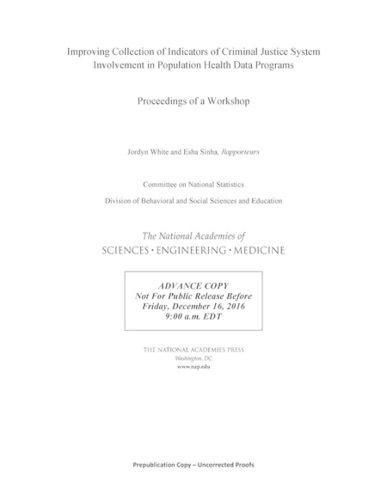Readings Newsletter
Become a Readings Member to make your shopping experience even easier.
Sign in or sign up for free!
You’re not far away from qualifying for FREE standard shipping within Australia
You’ve qualified for FREE standard shipping within Australia
The cart is loading…






In the U.S. criminal justice system in 2014, an estimated 2.2 million people were in incarcerated or under correctional supervision on any given day, and another 4.7 million were under community supervision, such as probation or parole. Among all U.S. adults, 1 in 31 is involved with the criminal justice system, many of them having had recurring encounters.
The ability to measure the effects of criminal justice involvement and incarceration on health and health disparities has been a challenge, due largely to limited and inconsistent measures on criminal justice involvement and any data on incarceration in health data collections. The presence of a myriad of confounding factors, such as socioeconomic status and childhood disadvantage, also makes it hard to isolate and identify a causal relationship between criminal justice involvement and health. The Bureau of Justice Statistics collects periodic health data on the people who are incarcerated at any given time, but few national-level surveys have captured criminal justice system involvement for people previously involved in the system or those under community supervision?nor have they collected systematic data on the effects that go beyond the incarcerated individuals themselves.
In March 2016 the National Academies of Sciences, Engineering, and Medicine held a workshop meant to assist the Office of the Assistant Secretary for Planning and Evaluation (ASPE) and Office of the Minority Health (OMH) in the U.S. Department of Health and Human Services in identifying measures of criminal justice involvement that will further their understanding of the socioeconomic determinants of health. Participants investigated the feasibility of collecting criminal justice experience data with national household-based health surveys. This publication summarizes the presentations and discussions from the workshop.
$9.00 standard shipping within Australia
FREE standard shipping within Australia for orders over $100.00
Express & International shipping calculated at checkout
Stock availability can be subject to change without notice. We recommend calling the shop or contacting our online team to check availability of low stock items. Please see our Shopping Online page for more details.
In the U.S. criminal justice system in 2014, an estimated 2.2 million people were in incarcerated or under correctional supervision on any given day, and another 4.7 million were under community supervision, such as probation or parole. Among all U.S. adults, 1 in 31 is involved with the criminal justice system, many of them having had recurring encounters.
The ability to measure the effects of criminal justice involvement and incarceration on health and health disparities has been a challenge, due largely to limited and inconsistent measures on criminal justice involvement and any data on incarceration in health data collections. The presence of a myriad of confounding factors, such as socioeconomic status and childhood disadvantage, also makes it hard to isolate and identify a causal relationship between criminal justice involvement and health. The Bureau of Justice Statistics collects periodic health data on the people who are incarcerated at any given time, but few national-level surveys have captured criminal justice system involvement for people previously involved in the system or those under community supervision?nor have they collected systematic data on the effects that go beyond the incarcerated individuals themselves.
In March 2016 the National Academies of Sciences, Engineering, and Medicine held a workshop meant to assist the Office of the Assistant Secretary for Planning and Evaluation (ASPE) and Office of the Minority Health (OMH) in the U.S. Department of Health and Human Services in identifying measures of criminal justice involvement that will further their understanding of the socioeconomic determinants of health. Participants investigated the feasibility of collecting criminal justice experience data with national household-based health surveys. This publication summarizes the presentations and discussions from the workshop.